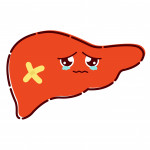Among people with HIV, injection drug users (IDUs) have a higher rate of end-stage liver and kidney disease but a lower rate of non–AIDS-defining cancers. Publishing their findings in the journal AIDS, researchers followed 5,490 HIV-positive people ages 25 to 59 who were enrolled in the Johns Hopkins HIV Clinical Cohort between 1995 and May 2014.
Thirty-seven percent of the cohort reported injection drug use as an HIV transmission risk factor.
By age 55, IDUs had a 6.8-fold greater likelihood of end-stage liver disease and a 11.1-fold greater likelihood of end-stage kidney disease compared with non-IDUs. Injection drug use was not associated with differences in the rate of heart attack or stroke. IDUs had a 4.9-fold decreased likelihood of being diagnosed with non–AIDS-defining cancers compared with non-IDUs.
The researchers concluded that higher rates of end-stage liver and kidney disease among HIV-positive IDUs highlight “the importance of recognition and management of markers of these comorbidities in early stages among” IDUs.
To read the study abstract, click here.







Comments
Comments